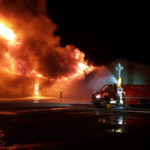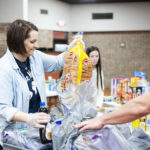At Pleasant Hill Missionary Baptist Church in Dallas, focusing on meeting needs in the community has reshaped the congregation’s sense of mission.
“When I was in school, one of my instructors asked a question, and it changed the whole course of our ministry,” Senior Pastor Kennon Tennison explained.
“He asked us, ‘If you left the community, would they know you were gone?’ And initially, that was ‘no,’ but now that’s absolutely ‘yes.’”
Pleasant Hill reaches its neighborhood in the Pleasant Grove area of southeastern Dallas by feeding the hungry.
That initiative not only includes reaching into the community through a food pantry, a ministry to the homeless and a turkey distribution every November before Thanksgiving, but also helping to meet needs among those who attend the church.
The church’s food ministry started about 15 years ago.
“A couple of my members were down in Midlothian moving a bedroom set, and the guy across the street heard them … talking about God,” Tennison recalled.
That individual walked across the street to visit with them, pray with them, and tell them about a food pantry he was involved with called “Dare to Care.”
“And the rest is history,” Tennison said.
Sign up for our weekly edition and get all our headlines in your inbox on Thursdays
After that interaction, word spread quickly that Pleasant Hill Missionary Baptist Church was starting an initiative to fight hunger in its neighborhood.
“From there, we were getting a lot of things, and a lot of people started hearing about us,” Tennison said. “I mean people were just dumping so much food on us and so many different products and items …we just started spreading the love.”
In addition to donated items, the church receives some support for its ministry—particularly to the unhoused population in Pleasant Grove—made possible through the Texas Baptist Hunger Offering.
The median household income in Pleasant Grove is about $41,500, and Tennison’s congregation reflects the community.
Meeting needs with the church family
“Half the stuff that we do—that we receive to give away—I give to my parishioners, because the community that God has put me over is the church that I’m pastoring,” he said.
“The community in which the church sits gets what’s left after the parishioners that are sitting in the pews that are hungry, that are homeless, that are broke. I found out in doing this that there were more people crying out from the pews than there were from the streets.”
As members of the congregation receive much-needed food and other assistance, they become capable and motivated to serve their neighbors.
“It gives you more bodies to reach the community. It expands your arm and puts it in the right perspective,” Tennison said.
Once all of his parishioners are fed, Tennison explained, the food pantry is open to the neighborhood.
Members also deliver food to other churches and distribution sites in the community, when resources allow it.
“At one point we were feeding—transitioning food—to about 28 different churches because we had so much,” he said. “One guy was particularly moved to taking stuff to the high schools in DeSoto, … and so he started getting lunch meat and peanut butter and jelly for the football players.”
Seeing lives changed
Tennison particularly rejoices when he sees lives transformed through the church’s hunger-fighting ministries. He recalled a man came in to visit the food pantry, overcame homelessness and struggles with substance abuse, and eventually became a member of the church.
“He was homeless, [and] he was trying to get to Houston to a rehab facility,” Tennison said. “We took him to the bus station and bought him a ticket, [and] sent him to the rehab facility.
“[He] got himself clean and came back and joined the church, … [and] his wife and daughter joined.”
The man’s journey to recovery has been difficult, Tennison acknowledged.
“He relapsed, but he’s in rehab now again, and he’s just so thankful that we didn’t just throw him away. That’s not our job … We’ve just got to love on you and keep things moving,” he said.
‘Everybody is treated with dignity’
The theme of love is at the heart of the church’s effort to feed the hungry, and Tennison explained he often follows up with people who come to the food bank to see if their conditions are improving.
However, intentional conversations about faith and lifestyle have to wait until basic needs are met, he noted.
“When they’re hungry, … they’re in a bad spot. But if you take the hunger and the noise from their stomach, they can hear your voice when you speak,” Tennison said. “They’ll never forget when they were hungry, and an organization fed them.”
At no point is anyone pressured to attend church in exchange for receiving help, he stressed. Rather, the church meets people where they are and extends love to them.
“We literally just said, ‘We’re going to offer Christ, love on you, feed you,” he said.
“God just kind of opened the door for us, and we walked through. … It’s been … amazing and profitable to the souls of the people in the community, as well as the church.
“I’m ecstatic about it. I won’t budge on it. This is how we do it. Everybody is treated with dignity and respect, loyalty and love. … You do not have to be embarrassed for where God has you at the moment.”
Lauren Turner, a student at the University of Mary Hardin-Baylor, served as an intern this semester with the Baptist Standard.














We seek to connect God’s story and God’s people around the world. To learn more about God’s story, click here.
Send comments and feedback to Eric Black, our editor. For comments to be published, please specify “letter to the editor.” Maximum length for publication is 300 words.